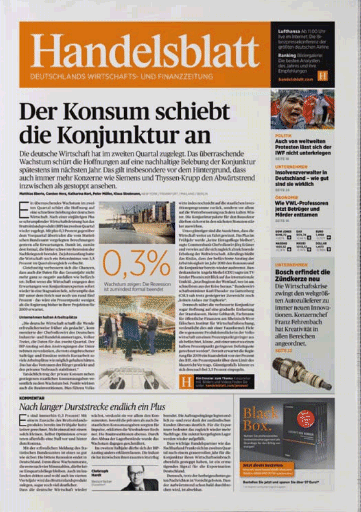 At right is the front page of Today’s Handelsblatt (April 29), a business newspaper in Germany of about 150,000. It competes with the German editions of the Wall Street Journal and Financial Times.
At right is the front page of Today’s Handelsblatt (April 29), a business newspaper in Germany of about 150,000. It competes with the German editions of the Wall Street Journal and Financial Times.
On a normal day, the Handelsblatt cover looks like the example at bottom — full of words and stories. Today, however, their cover is all black to powerfully illustrate the extreme distaste and opposition to a Greek bailout. They called yesterday “black Wednesday” in reference to German Prime Minister Angel Merkel’s change of heart regarding the need for a bailout of Greece.
Markets are rallying (again) on the idea that Greece will be bailed out and once and for all this issue will be put behind us. We say “again” because this is the fourth or fifth time risk markets have rallied on the idea a bailout is coming and this story will be over. In all those cases, they were disappointed.
- Bloomberg.com – Merkel Pressed to Enlist Banks in Greek Rescue as Bill Drafted
German lawmakers considering a bill to aid Greece challenged Chancellor Angela Merkel to involve banks in the rescue, refusing to back down after her government said that would send a “fatal signal” to markets. The main opposition Social Democratic Party threatened to withhold support for aid next week when the bill is fast-tracked through parliament unless banks are asked to contribute. Members of Merkel’s Christian Democrats said the government should ask banks to voluntarily accept losses on their investments. - Der Spiegel – Euro Fears Force Merkel To Act
After weeks of hesitation over the German response to the Greek crisis, Chancellor Angela Merkel is suddenly calling for swift action. “It is clear that the negotiations must now be accelerated,” she said Wednesday at an appearance with Dominique Strauss-Kahn, the head of the International Monetary Fund (IMF), in Berlin. A serious-looking Merkel called for an agreement to assist Greece “within the next few days,” adding: “We will not back out.” Observers were surprised by Merkel’s strong words. Until now, the chancellor has not exactly come across as a driving force when it comes to action on the Greek crisis. Merkel has long been reluctant to promise the Greeks billions of euros in European aid, something which has earned her the nickname “Madame Non” in the European Union. At home in Germany, however, she has been feted by the tabloid press as the “Iron Chancellor” because she had rebuffed the “bankrupt Greeks.” - Marketnews – EBRD Head Warns Against Banks Absorbing Costs Of Greek Rescue
The president of the European Bank for Reconstruction and Development (EBRD), Thomas Mirow, warned Friday against making banks shoulder part of the aid for Greece because this would weaken them again. “Therefore a bailout that would include the banks could be more costly for taxpayers than a straight bailout by states,” Mirow, a German national, told reporters on the sidelines of a conference organized by the Aspen institute here. “This is what one has to be very careful [about],” he said. A senior member of German Chancellor Angela Merkel’s CDU/CSU-FDP government coalition said Thursday that there should be discussions with Greece’s creditors about a voluntary haircut on their claims. “We should talk with banks and other investors about voluntarily forgoing their claims” against Greece, Leo Dautzenberg, the CDU/CSU’s parliamentary financial policy speaker, urged. Nobert Barthle, the CDU/CSU’s parliamentary budget speaker, said on Wednesday there was significant resistance inside the CDU/CSU parliamentary group against aid for Greece without participation of the creditors.



What's been said:
Discussions found on the web: